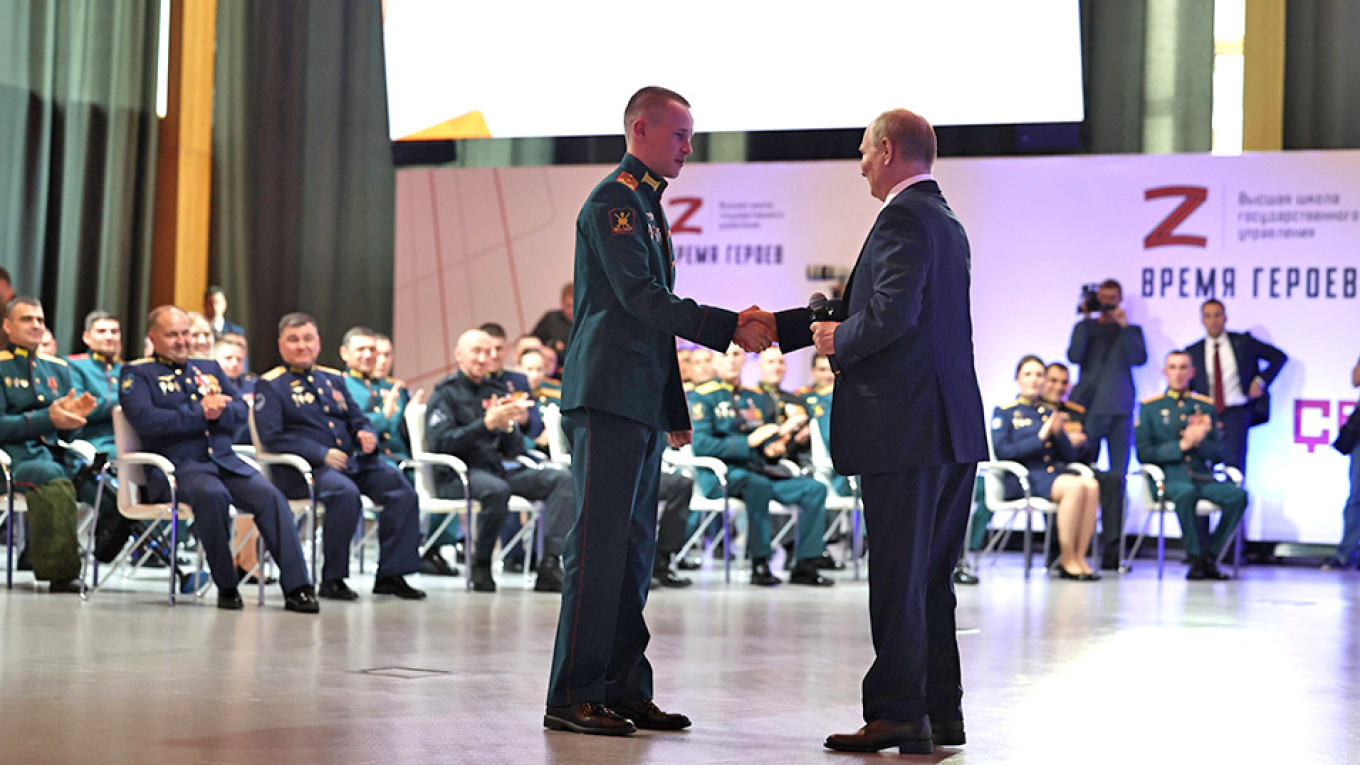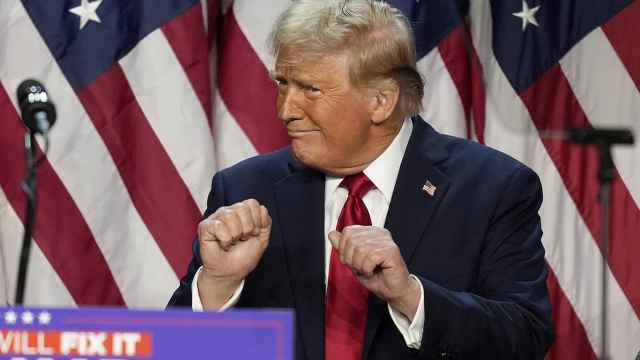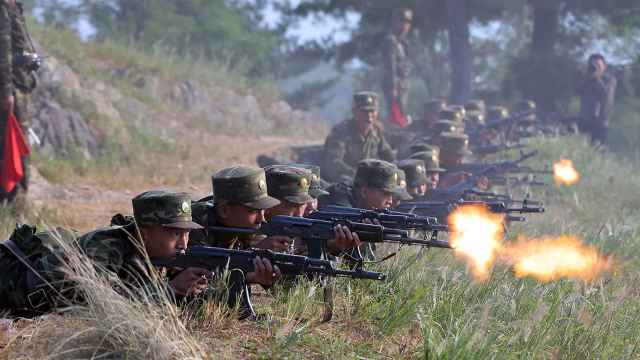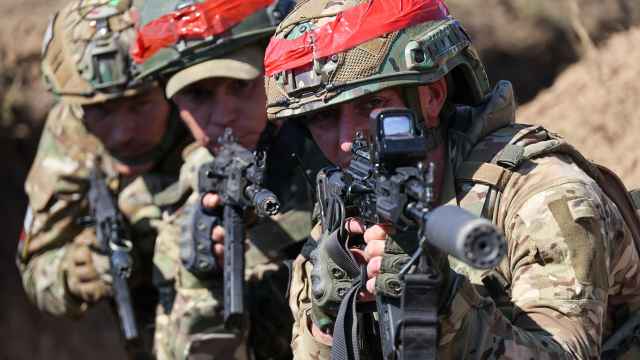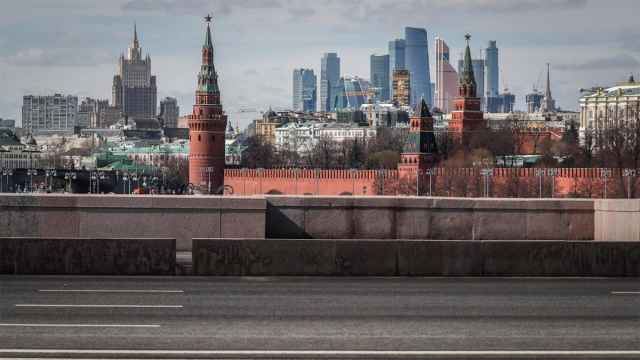The Kremlin is attempting to create the illusion that Russian men who fight in Ukraine will enjoy greater career prospects — including the possibility of future government roles — as it grapples with a shortage of military volunteers and seeks to quell criticism from Ukraine war veterans.
Russian media reported Monday that several veterans of the invasion of Ukraine are interning in the presidential administration as part of the Kremlin's Time of Heroes professional training program. The Kremlin later confirmed the reports.
Ever since President Vladimir Putin proclaimed in February that Ukraine war veterans would become the “new elite” of society, the Kremlin has been working to bolster this image through television propaganda and programs like Time of Heroes.
By doing so, the authorities are trying to make serving in the army appear as attractive as possible to potential recruits, independent political analyst Abbas Gallyamov told The Moscow Times.
The Kremlin’s other important task is to give Russia’s hundreds of thousands of war veterans the impression that their sacrifices were for a reason — and that they or their comrades have the chance, albeit an elusive one, to join the Russian elite.
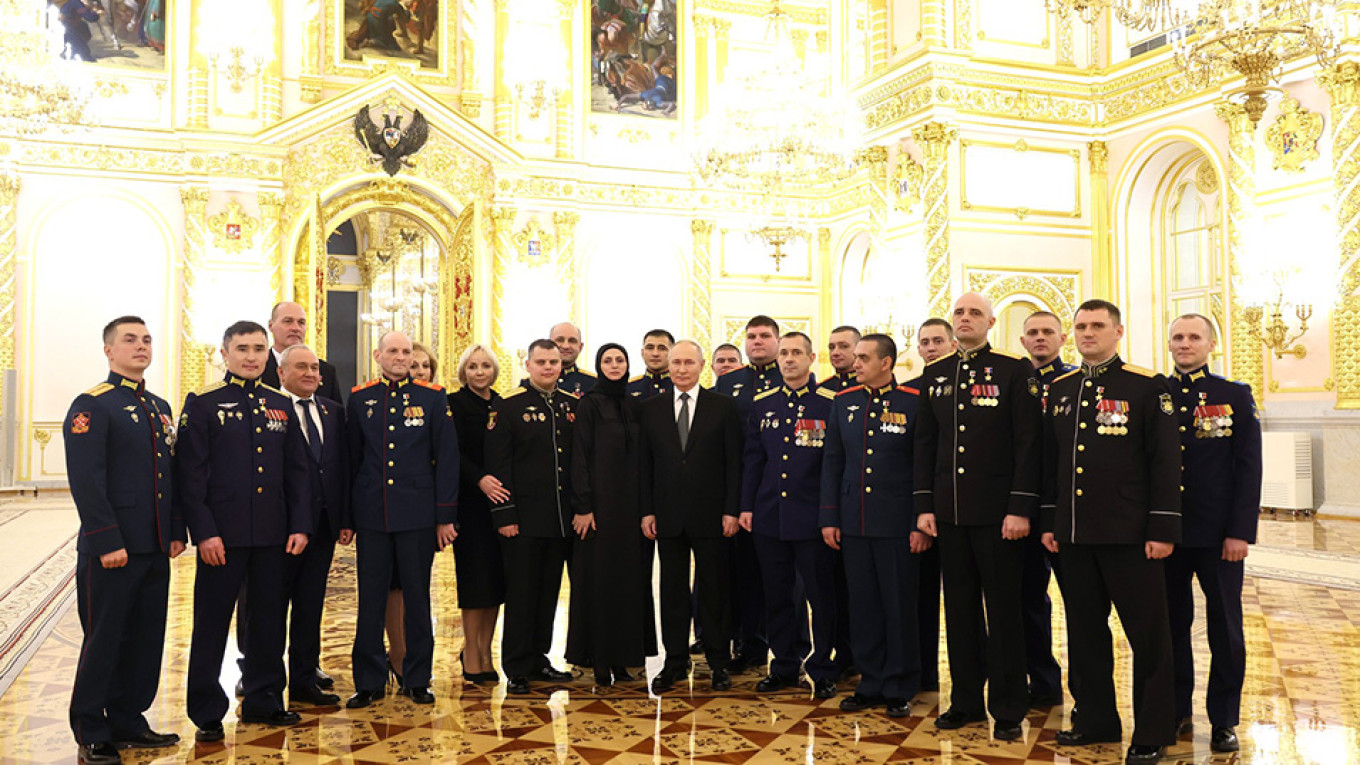
The Vedomosti business daily, citing Kremlin sources, reported that “several” Ukraine war veterans are now undergoing junior internships in the presidential administration’s powerful domestic policy bloc.
Only two of them, Major Denis Didenko and army officer Anton Shorokhov, were identified by name. While little is publicly known about these men, Didenko was able to address Putin at a June 2024 event that, as The Moscow Times understands, was completely staged.
A total of 83 people were enrolled in the Time of Heroes program in 2024. The exact number of these trainees who took part in the full-scale invasion of Ukraine — and who were placed in internships in the presidential administration — remains unknown.
One of the program’s participants who was not placed in the presidential administration, Nursultan Mussagaleev, was suspected by Ukraine’s SBU security service of involvement in at least one episode of torture and killings of civilians in the town of Bucha outside Kyiv in the spring of 2022. At least four others may have been involved in the Russian occupation of Bucha and the battle for Mariupol in eastern Ukraine, according to the independent Russian investigative outlet Agentsvo.
Program participants fit into two categories: men who served as officials before the war and went to the front to make a name for themselves and advance their careers, and war veterans with no prior experience in public office.
The latter group cannot qualify for high-level positions, Vedomosti wrote, citing political analyst Rostislav Turovsky.
While a few hundred war veterans might have a chance to become regional or local officials, this is less than 1% of the hundreds of thousands who have fought in Ukraine over the past two and a half years.
Nonetheless, the war in Ukraine has offered contract soldiers unprecedented opportunities for socioeconomic advancement, a significant shift from the first two decades of Putin’s rule. In addition to receiving salaries far higher than the national average, men who sign contracts to fight, along with their families, are entitled to generous state benefits and priority admission to universities.
Speaking to The Moscow Times, a Russian government official said the Kremlin not only wishes to financially reward those involved in its so-called “special military operation” but to co-opt those “who fight and shed blood for the regime” into the upper echelons of power as a common practice.
“This is what all countries and all peoples have always done,” the official said, speaking on condition of anonymity.
However, analyst Gallyamov argued that the internship scheme is more about fulfilling the Kremlin’s broader propaganda and bureaucratic goals than a genuine effort to integrate veterans into its ranks.
Influential officials like Foreign Minister Sergei Lavrov, SVR chief Sergei Naryshkin, Rostec head Sergei Chemezov and Security Council Deputy Chair Dmitry Medvedev — as well as tycoons like German Gref, Igor Sechin, Alexei Miller, the Rotenbergs, the Kovalchuks and Gennady Timchenko — are all tight-knit with Putin and have held their positions for many years.
And when Putin does reshuffle his officials — like he did after winning re-election in March — he taps the family and friends of his inner circle, fellow KGB alumni or his longtime associates from St. Petersburg rather than genuine newcomers.
“This is a show-off, there won't be many such people [veterans]. All the seats in the Russian halls of power have long been filled,” Gallyamov, Putin's exiled former speechwriter who was sentenced to eight years in prison in absentia for “spreading fakes” about the Russian army, told The Moscow Times.
“First of all, this is a bureaucratic story. Putin ordered it — they all [officials] rushed to fulfill it. Putin is satisfied — so everyone is happy,” Gallyamov said.
“It's also an excuse for propagandists to say once again that ‘the heroes of the special military operation are the new elite.’ This is important from the point of view of finding new contractors.”
A Message from The Moscow Times:
Dear readers,
We are facing unprecedented challenges. Russia's Prosecutor General's Office has designated The Moscow Times as an "undesirable" organization, criminalizing our work and putting our staff at risk of prosecution. This follows our earlier unjust labeling as a "foreign agent."
These actions are direct attempts to silence independent journalism in Russia. The authorities claim our work "discredits the decisions of the Russian leadership." We see things differently: we strive to provide accurate, unbiased reporting on Russia.
We, the journalists of The Moscow Times, refuse to be silenced. But to continue our work, we need your help.
Your support, no matter how small, makes a world of difference. If you can, please support us monthly starting from just $2. It's quick to set up, and every contribution makes a significant impact.
By supporting The Moscow Times, you're defending open, independent journalism in the face of repression. Thank you for standing with us.
Remind me later.



